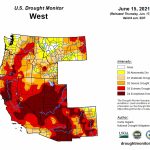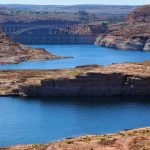In a few months, Utah will have at least three water judges.
The change is published in Utah Code Jud. Admin. 6-104 , effective November 1, 2022. According to the Salt Lake Tribune
, effective November 1, 2022. According to the Salt Lake Tribune


The Rule reads:
Intent:
- To designate certain district court judges as water judges.
- To establish a procedure whereby district court water cases are heard by designated water judges.
- To designate a supervising water judge.
Applicability:
This rule shall apply to district court judges.
Statement of the Rule:
(1) Council Designation. The Judicial Council shall formally designate at least three district court judges who volunteer as water judges. In making the designation, the Judicial Council shall consider the knowledge and experience of the judge in relation to cases involving the adjudication of water rights, or the willingness of that judge to become familiar with this area of the law.
(2) Request for Assignment. If a party to an action filed under Utah Code Title 73, Chapter 3 or Chapter 4 makes a request, as part of the complaint or first responsive pleading, to have the case assigned to a water judge, the case will be assigned to a water judge. Thereafter, a request to have the case assigned to a water judge may be granted in the discretion of the judge assigned to the case. Additionally, a party may request that a non-Chapter 3 or Chapter 4 case be assigned to a water judge. Non-Chapter 3 or 4 cases will be reviewed and assigned by the supervising water judge if the case is of sufficient legal complexity as related to water law to warrant assignment to a water judge.
(3) Assignments. Assignment of cases involving water law to a water judge shall be made on a random basis. Assignment may include an adjustment in the judge’s calendar to allow the judge to handle the case.
(4) Supervising Water Judge. The water judges shall elect one of the water judges to be the supervising water judge. The term of office of the supervising water judge is two years beginning July 1. The supervising water judge shall be primarily responsible for:
(4)(A) the assignment of water law cases to water judges;
(4)(B) the coordination of schedules of water judges and the assignment of courtrooms and facilities in conjunction with the state court administrator and the presiding judge of each district court;
(4)(C) addressing concerns of water judges, other district court judges, or the Judicial Council regarding the management of district court water law cases;
(4)(D) overseeing the water law education of the water judges, in conjunction with the Standing Committee on Judicial Branch Education and the Utah Judicial Institute;
(4)(E) presiding over meetings of the water judges;
(4)(F) the use of law clerk resources to develop water expertise, to assist the water judges, and to facilitate consistency in the development of case precedents in the water law area and otherwise assist in the transition as new water judges are designated; and
(4)(G) coordinating with the water judge’s presiding judge regarding any appropriate adjustments to the water judge’s caseload.
(5) Posting Decisions. If a water judge decides a water law case of first impression, the water judge shall cause the decision to be posted. A decision need not be posted where the case deals with settled rules of law.
(6 )Term. Water judges shall serve only so long as they are district court judges. Water judges may, however, resign as water judges, at their own request or the request of the Judicial Council, while still serving as district court judges.
(7) Caseload. If a water judge does not have a full workload of water law cases, the judge shall hear non-water law district court cases to maintain a full workload of cases.
(8 ) Venue. Nothing in this rule affects venue.
Adopted May 31, 2022, effective 11/1/2022






Leave a Reply